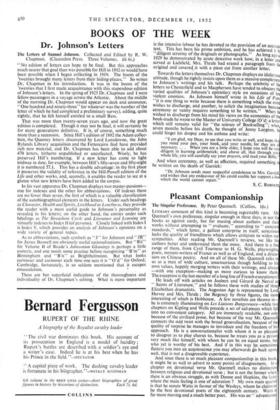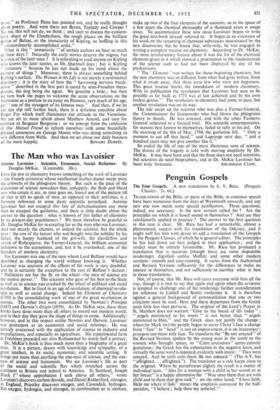Pleasant Companionship
The Singular Preference. By Peter Quennell. (Collins. 1,6s.) LITERARY comment of this kind is becoming regrettably rare. Mr Quennell's own preference, singular enough in these days, is not fo books as against cards, but for musing about authors and thei works without attempting to " evaluate," according to " concret standards," which latter, a gallant enterprise in itself, sometime- lacks the quality of friendliness which allows criticism to widen o sympathies. After reading Mr. Quennell's reviews, we like his authors better and understand them the more. And there is a fin range of them, from Cyril Tourneur to H. G. Wells, playwrights poets, memoir-writers of France as well as of England, and a discur sion on Chinese poetry. And on all of these Mr. Quennell talks t' us as a man of wide culture, uncensorious though holding to hi own values, happily merging writers with their writings, and always —with one exception—making us more curious to know them. The exception is the last member of a long line of French executioners!
He leads off with articles on Joubert and Gerard de Nerval as " Saints of Literature," and he follows these with studies of three Elizabethan dramatists. The Augustan Age is represented by Lord Hervey and Mrs. Thrale ; the Regency by three figures, the most interesting of which is Hobhouse. A few novelists are thrown in— he is extremely illuminating on Les Liaisons Dangereuses—while two chapters on Kipling and Wells precede a set of tail-pieces which fall into no convenient category. All are immensely readable, not only because of the civilised prose, but because of the way Mr. Quennell connects the odd twist with the broad generalisation, because of the quality of surprise he manages to introduce and the freedom of his approach. He is a conversationalist with whom it is as pleasant to disagree as to play chorus to, because he treats you as a person very much like himself, with whom he can be on equal terms, but who yet is worthy of his best. And if in this way he sometime flatters you into an acquiescence you may afterwards do back upon, well, that is not a disagreeable experience. And since there is so much pleasant companionship in this book, it might be as well to advert to some points of disagreement. In a chapter on devotional verse Mr. Quennell makes no distinction between religious and devotional verse ; but is not the former where there is an obvious struggle, as with Donne and Hopkins, the latter where the main feeling is one of adoration ? My own main quarrel is that he scouts Watts in favour of the Wesleys, whom he claims to be the best devotional poets of the eighteenth century. Watts far more moving and a much better poet. His was an " adventure muse," as Professor Pinto has pointed out, and he really thought about poetry. And were there not Byron, Toplady and Cowper ? No, no, this will not do, we think ; and start to discuss the existent- lialist Angst of the Elizabethans, the rough places on the brilliant genius of Balzac, or the immaturity of Kipling. so baffling in this " extraordinarily accomplished artist."
What is this " immaturity " of certain authors we hear so much of these days ? Naturally the early stories deierve the stigma, but is it true of the later ones ? It is refreshing to read anyone on Kipling who knows the later stories, as Mr. Quennell does ; but is Kipling " immature " because he has not made up his mind about the mystery of things ? Moreover, there is always something behind Kipling's surface. The Woman in his Life is not merely a sentimental dog-story ; it is the story of how the " harrowing nervous break- down " described in the first part is cured by semi-Freudian thera- peutics, the dog being the agent. We grumble a little ; but then we turn back the pages to welcome the acute observations on the Victorians as a preface to an essay on Patmore, very much of his age, yet " one of the strangest of its famous men." And then, if we let our eye slip still further back, there is a delicious anecdote about Roger Fry which itself illuminates our attitude to the Victorians. We are set to muse afresh about Matthew Arnold, and turn for contrast to Sergeant Burgoyne ; or we emerge from the confusion of Our Mutual Friend to refresh ourselves with some beautifully phrased comments on George Moore who was doing something so very different from Wells. And then we set about our daily business



































 Previous page
Previous page